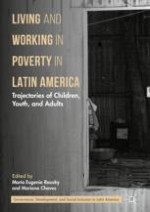2019 | OriginalPaper | Chapter
5. Work and Schooling in the Life Course of Poor Young People in Rio de Janeiro
Authors : Ana Karina Brenner, Paulo Carrano
Published in: Living and Working in Poverty in Latin America
Publisher: Springer International Publishing
Activate our intelligent search to find suitable subject content or patents.
Select sections of text to find matching patents with Artificial Intelligence. powered by
Select sections of text to find additional relevant content using AI-assisted search. powered by
